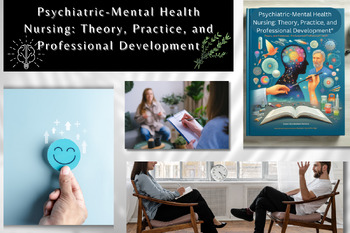Psychiatric-Mental Health Nursing: Theory, Practice, Professional Development
Anthony Okoye
9 Followers
Grade Levels
Higher Education, Adult Education, Homeschool, Staff
Subjects
Resource Type
Formats Included
- PDF
Anthony Okoye
9 Followers
Description
As an educator in the field of psychiatric-mental health nursing, having a comprehensive handbook on the subject provides several benefits:
- Resource for Curriculum Development: The handbook serves as a valuable resource for developing curriculum content for psychiatric-mental health nursing courses. It covers a wide range of topics, including theoretical frameworks, assessment, therapeutic modalities, psychiatric disorders, special populations, legal and ethical considerations, practice settings, and self-care strategies. Educators can use the handbook to design lesson plans, create learning activities, and structure course materials that align with the content covered in the handbook.
- Reference for Teaching Materials: Educators can use the handbook as a reference guide for creating teaching materials, such as PowerPoint presentations, lecture notes, case studies, and discussion prompts. The handbook provides detailed information on key concepts, theories, assessment tools, interventions, and best practices in psychiatric-mental health nursing, serving as a foundation for developing educational resources that enhance students' understanding and competency in the field.
- Support for Evidence-Based Teaching: The handbook is based on evidence-based practices and current standards of psychiatric-mental health nursing care, providing educators with up-to-date information and resources to support evidence-based teaching. Educators can incorporate evidence-based guidelines, research findings, and clinical recommendations from the handbook into their teaching to ensure that students receive instruction grounded in the latest evidence and best practices in the field.
- Guide for Clinical Practice Integration: The handbook offers practical guidance and insights into psychiatric-mental health nursing practice, including assessment techniques, therapeutic modalities, diagnostic frameworks, legal and ethical considerations, and self-care strategies. Educators can use the handbook to facilitate the integration of theoretical knowledge into clinical practice by discussing case studies, role-playing scenarios, and simulation exercises that simulate real-world clinical situations encountered by psychiatric-mental health nurses.
- Professional Development Tool: Educators can utilize the handbook as a professional development tool to enhance their own knowledge and skills in psychiatric-mental health nursing. By staying informed about current trends, best practices, and emerging issues in the field, educators can enhance their teaching effectiveness, provide mentorship to students, and contribute to the advancement of psychiatric-mental health nursing education and practice.
Overall, having a comprehensive handbook on psychiatric-mental health nursing benefits educators by providing a valuable resource for curriculum development, teaching materials, evidence-based instruction, clinical practice integration, and professional development. The handbook serves as a foundational tool for educators to enhance the quality of psychiatric-mental health nursing education and prepare students for successful careers in the field.
Total Pages
Answer Key
N/A
Teaching Duration
N/A
Report this resource to TPT
Reported resources will be reviewed by our team. Report this resource to let us know if this resource violates TPT’s content guidelines.


